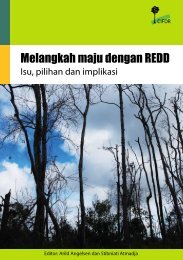Adaptive collaborative management of community forests in Asia ...
Adaptive collaborative management of community forests in Asia ...
Adaptive collaborative management of community forests in Asia ...
You also want an ePaper? Increase the reach of your titles
YUMPU automatically turns print PDFs into web optimized ePapers that Google loves.
148 • Eva Wollenberg, Ramses Iwan, Godw<strong>in</strong> Limberg, Moira Moeliono, Steve Rhee and Made Sudana<br />
are not limited by people’s cognitive and organisational skills (diZerega<br />
2000).<br />
Such cooperation is self-organised <strong>in</strong> a way similar to hot groups (Lipman-<br />
Blumen and Leavitt 1999). Hot groups do not constitute a structural<br />
unit <strong>in</strong> an organisation. People come together spontaneously because <strong>of</strong> a<br />
common mission and dedication to a task. Be<strong>in</strong>g flexible, such groups have<br />
the advantage <strong>of</strong> be<strong>in</strong>g able to organise themselves quickly and have high<br />
motivation and capacity for <strong>in</strong>novation. The hot group focuses more on<br />
ideas and work, and less on the emotionality <strong>of</strong> relationships.<br />
Understand<strong>in</strong>g how these spontaneous forms <strong>of</strong> cooperation work <strong>in</strong> Mal<strong>in</strong>au<br />
is precisely what gave us and, more importantly, the villagers the space to<br />
manoeuvre. We can move easily from one current <strong>of</strong> actors and activities to<br />
converge with another <strong>in</strong> the system rather than seek<strong>in</strong>g to mechanically<br />
eng<strong>in</strong>eer changes to these flows outside it. The ma<strong>in</strong> requirement for mak<strong>in</strong>g<br />
this work is excellent channels <strong>of</strong> <strong>in</strong>formation to recognise the possibilities<br />
for convergence. In our case we achieved this through a local presence<br />
and high social embeddedness (shar<strong>in</strong>g local values, participat<strong>in</strong>g <strong>in</strong> local<br />
events and build<strong>in</strong>g strong personal relationships).<br />
Facilitat<strong>in</strong>g by muddl<strong>in</strong>g through: reflections<br />
James Scott (1998: 313) suggests that where authoritarian states coexist<br />
with a ‘prostrate civil society’, social change needs to take place through<br />
<strong>in</strong>stitutions that are ‘multifunctional, plastic, diverse and adaptable’, shaped<br />
by practical skills and <strong>in</strong>telligence <strong>in</strong> response to a chang<strong>in</strong>g environment.<br />
These processes should occur <strong>in</strong> ‘small steps’ favor<strong>in</strong>g small-scale learn<strong>in</strong>g,<br />
reversibility and accommodation <strong>of</strong> surprises and human <strong>in</strong>ventiveness<br />
(Scott 1998: 345). In this way, weaknesses <strong>in</strong> governance to cope with<br />
change can be overcome.<br />
As the discussion above <strong>in</strong>dicates, Scott’s tenets were central to our<br />
facilitation strategy <strong>in</strong> Mal<strong>in</strong>au. We used adaptive methods <strong>in</strong> Mal<strong>in</strong>au as<br />
an approach to facilitation rather than as a reflective process <strong>of</strong> learn<strong>in</strong>g by<br />
local forest users. <strong>Adaptive</strong> methods made it possible for us to work with<br />
the exist<strong>in</strong>g spontaneous order <strong>of</strong> cooperation.
















